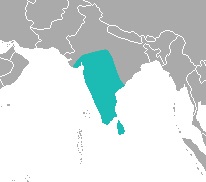Rusty-spotted cat
| Rusty-spotted Cat[1] | |
|---|---|
| File:Rostkatze-01.jpg | |
| Scientific classification | |
| Kingdom: | |
| Phylum: | |
| Class: | |
| Order: | |
| Family: | |
| Genus: | |
| Species: | P. rubiginosus
|
| Binomial name | |
| Prionailurus rubiginosus | |

| |
| Rusty-spotted cat range | |
The rusty-spotted cat (Prionailurus rubiginosus) is a very small wild cat of southern India and Sri Lanka. It is 35-48 cm (14-17 in) in length, plus 15-25 cm (6-10 in) tail, weighing in at only approximately 1.5 kg (3.3 lbs). Since adult females can weigh as little as 1 kg (2.2 lbs) or less, this species rivals (and may exceed) the black-footed cat as the world's smallest wild cat. The color of the fur is grey, with rusty spots all over the back and the flanks, while the underbelly is white with large dark spots. The tail, thick and about half the length of the body, is darker in color than the body and the spots are less distinct. All in all this cat is quite similar to the related leopard cat (Prionailurus bengalensis).
Habitat and behaviour
The Indian populations of the rusty-spotted cat mainly lives in tropical dry forests and dry grasslands, but in Sri Lanka rainforests are the preferred habitat. The reason for this difference may be the competition with the leopard cat, which occupies the rainforests of the mainland, but does not live in Sri Lanka.
This cat is nocturnal and partly arboreal, and feeds on rodents, birds and lizards. Its nature is described as friendly and playful, making it conducive for domestication as pets. It is also hunted for food in some areas by local human populations.
Conservation
The rusty-spotted cat faces a high risk of extinction in the wild and is listed as vulnerable on the IUCN Red List.[2] More specifically, the Convention on International Trade in Endangered Species of Wild Flora and Fauna (CITES) lists the Indian population in Appendix I (threatened with extinction where trade in the specimens is only allowed in exceptional circumstances) and the other populations in Appendix II (not necessarily threatened with extinction, but where trade in the furs is strictly controlled).
Subspecies
There are two subspecies:
- Prionailurus rubiginosus rubiginosus, India
- Prionailurus rubiginosus phillipsi, Sri Lanka
References
- ^ Wozencraft, W. C. (2005). "Order Carnivora". In Wilson, D. E.; Reeder, D. M. (eds.). Mammal Species of the World: A Taxonomic and Geographic Reference (3rd ed.). Johns Hopkins University Press. pp. 543–544. ISBN 978-0-8018-8221-0. OCLC 62265494.
- ^ a b Template:IUCN2006 Database entry includes justification for why this species is vulnerable

